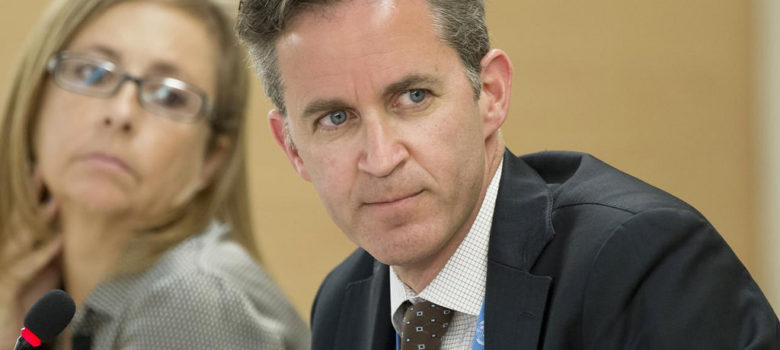The United Nations Special Rapporteur on the Right to Freedom of Opinion and Expression has filed an intervention with the CRTC expressing concern with the Bell coalition’s website blocking plan, which he confirms “raises serious inconsistencies with Canada’s obligations under Article 19 of the International Covenant on Civil and Political Rights and related human rights standards.” Special Rapporteurs are independent human rights experts with mandates from the Human Rights Council to report and advise United Nations Member States on human rights issues. While many supporters of the blocking plan have dismissed freedom of expression concerns, David Kaye, the expert the U.N. has tasked with making recommendations to member states warns that it may violate Canada’s human rights obligations in several ways.
The Special Rapporteur’s concerns, many of which were echoed in submissions critical of the blocking plan (I identified similar concerns in my post on the issue and in my submission to the CRTC that should be posted shortly), focus on the lack of proportionality, the risk of over-blocking, and process shortcomings with the proposed website blocking agency.
With respect to the lack of proportionality, the Special Rapporteur states:
While the enforcement of copyright law may be a legitimate aim, I am concerned that website/application blocking is almost always a disproportionate means of achieving this aim. Blocking an entire website/application will not only restrict allegedly infringing activity, but also cut off access to all legitimate content on that website or uses of that application. The risk that online expression will be disproportionately restricted is particularly high for websites/applications that are implicated in copyright infringement but also widely used to protect personal identity and security, such as VPNs, proxy services and peer-to-peer networks.
Moreover, the Special Rapporteur notes the chilling effect of site blocking:
Even if a website/application is not ultimately blocked, the mere threat of blocking may have a significant and disproportionate chilling effect on its operation. Rather than risk the shutdown of their website/application, the owner/operator is more likely to err on the side of caution and take down material that may be perfectly legitimate or lawful. The threat of blocking may also incentivize owners/operators to proactively monitor their websites or applications for copyright infringement, increasing the risk of prior censorship.
The Special Rapporteur then turns to another frequently identified concern: the likelihood of over-blocking. Of particular concern is the definition for “piracy”, which “creates the risk that findings of piracy – and the subsequent classification and blocking of “piracy sites” – would be based on unproven or misleading allegations of copyright infringement.” The Special Rapporteur also notes the lack of consideration of non-infringing uses or proportionality. He also warns:
At least two of the proposed factors – consideration of past findings and efforts to evade legal action – appear designed to calculate the likelihood of future infringing activity. The possibility that
blocking orders will be issued to prevent future infringements raises concerns of prior censorship, which is almost always disproportionate.
The Special Rapporteur also has concerns with the Internet piracy review agency, which he says lacks due process in light of procedural shortcomings. He identifies several problems:
- Creating a private entity would exempt the IRPA from transparency requirements such as Access to Information rules
- Concerns that rights holders and ISPs would effectively exert board control
- The funding model “raises questions of impartiality” since the IRPA would depend upon the volume of website blocking requests and the initial funding would come from the coalition behind the proposal
- He expresses doubt about whether carriers are equipped to function as neutral gatekeepers in the standards setting process given the state of vertical integration with carriers often also owning broadcast properties
The concerns associated with freedom of expression and human rights have been raised from the very outset of the Bell coalition proposal. While supporters have dismissed the concerns, the fact that the U.N. Special Rapporteur David Kaye identified the need to intervene in the Canadian case and raise concerns about inconsistencies with Canada’s human rights obligations speaks volumes about the dangers associated with the website blocking plan. The Canadian government led by Prime Minister Trudeau and Global Affairs Minister Chrystia Freeland have placed a high priority on human rights obligations and the intervention should attract attention from departments that do not typically focus on CRTC or copyright policy.








Pingback: United Nations Blasts Canada's Site Blocking Proposal
Pingback: My CRTC Submission on the Bell Coalition Site Blocking Plan: Why it is Disproportionate, Harmful, and Inconsistent With Global Standards - Michael Geist
Pingback: Telus' Website Blocking Submission: No Copyright Expertise Needed and No Net Neutrality Violation if Everyone Blocks Websites - Michael Geist
Also read this;
https://thetrichordist.com/2018/04/01/gone-phishing-un-official-uses-lookalike-website-in-attempt-to-block-anti-piracy-law/